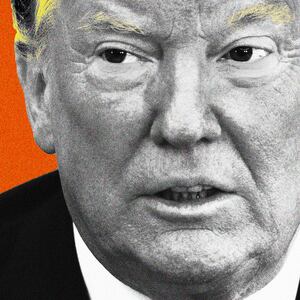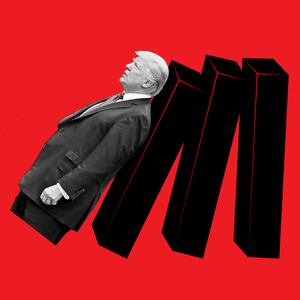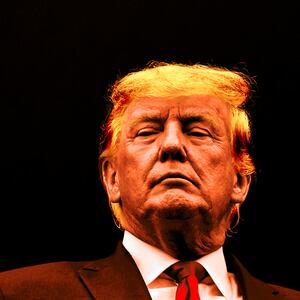Get more news and opinions in the twice-daily Beast Digest newsletter. Don’t miss the next big story, sign up here.
The unsealing of Manhattan District Attorney Alvin Bragg’s historic indictment of former President Donald Trump reveals a solid prosecution case. Much of the controversy over Bragg bringing the case has been disparagement of the charges as potentially being only misdemeanors, claims that the charges will be “novel” ones based on untested legal theories, and attacks on the credibility of the expected star witness Michael Cohen—who was Trump’s former fixer attorney and convicted for his role in paying the hush money to the adult film actress star Stormy Daniels.
Bragg has answered these attacks via a strategically crafted indictment.
The indictment lays out 34 felonies (not misdemeanors) which are based on the theory that the falsification of business records constitute felonies because they were made to cover up other crimes.
What are the other crimes? Election laws and possibly tax crimes are referenced in the statement of facts accompanying the indictment, but the specifics are not spelled out. This minimalist approach may serve Bragg well at this stage.
Part of this strategy is that the indictment itself is bare-bones and not what is commonly called a “speaking indictment”—meaning it does not lay out a full narrative.
While a full narrative would be helpful to public understanding of the case, it also would commit prosecutors to facts which could be attacked publicly, and potentially set up discrepancies with eventual testimony that might raise legal issues both at trial and on appeal. Putting forth only the minimum facts supporting the charges protects more of the substance of what critical witnesses—like Cohen and former National Enquirer publisher (and CEO of its parent company, American Media) David Pecker—will have already told investigators in interviews, as well as in grand jury testimony.
Trump’s attorneys will eventually get details from the discovery process and may also file what’s called a bill of particulars—a motion seeking greater specificity about charges. But in the short run, the spare style of the indictment deprives Trump’s legal team of specifics to attack from both factual and legal angles.
Not going into detail on exactly what “election laws” were violated also fends off for now the issue of whether Bragg is using untested “novel” legal theories. Much of the speculation about what might be novel about the prosecution has centered on whether Bragg would seek to bootstrap his case by using federal campaign finance violations rather than state crimes. Such a theory could open up an avenue of attack from Trump’s lawyers arguing that a state prosecutor like Bragg cannot bring federal charges and/or that federal law would preempt the case entirely. But the indictment does not wed itself to federal crimes, it only makes general references to “election laws”—which can encompass both state and federal laws and which gives the prosecution more flexibility in its choice of which laws to pair to the basic falsification of records charge.
Can’t get enough from The Daily Beast? Subscribe to the twice-daily Beast Digest newsletter here.
Moreover, the statement of facts also references “mischaracterization for tax purposes” of the business records, which raises the possibility that tax violations could have been covered up in the same manner by which the business records were falsified. Giving themselves these two broad categories of crimes affords the prosecution more protection against the possibility of any one theory being vulnerable to legal attacks via a motion to dismiss prior to trial—or even post-conviction appeals.
But the indictment’s biggest surprise is likely the pivot away from all eyes being on Michael Cohen as the sole backbone of the case, as well as the perception of the case as solely focused on Stormy Daniels.
Much of the criticism of the case as being weak has focused on assertions that jurors will not believe a cooperator like Cohen—who has already been convicted for the crime. Holding aside the fact that cooperators are used in successful prosecutions every day all across the country and the fact that Cohen’s version has been remarkably consistent over the years, it is now clear that Cohen is not the only critical witness.
Instead, former National Enquirer boss David Pecker is referenced in the indictment repeatedly over his role in killing the hush money payment story that was to have been published by the supermarket tabloid. Pecker serves the critical function of corroborating Cohen, so that whatever points Trump’s legal team might score against Cohen as a cooperator will be mitigated by similar testimony coming from Pecker, as well.
Emphasizing Pecker’s role carries the dual effect of also emphasizing that the case is not about a one-off payment to Stormy Daniels, given that Pecker’s role evidences the pattern and plan of Trump in making payments to buy the silence of not only Ms. Daniels, but also (potentially) former Playboy model Karen McDougal—who also allegedly had an affair with Trump—as well as a doorman at Trump Towers, who supposedly had information about a child fathered by Trump out of wedlock.
Patterns of behavior by a defendant make particularly compelling evidence to jurors, as people often reason that evidence proving a single instance of alleged wrongdoing might not meet the high standard of guilt beyond a reasonable doubt, but a pattern of wrongdoing tends to assuage doubt.
For criminal defendant Donald Trump, the patterns may be what he needs to most worry about in this and other cases yet to come.
Sign up for the Beast Digest, a twice-daily run down on each day’s top stories. Don’t miss out, sign up here.








